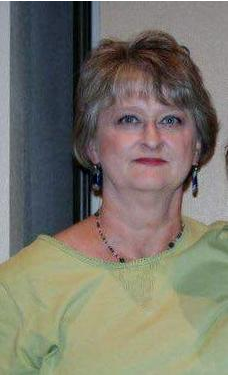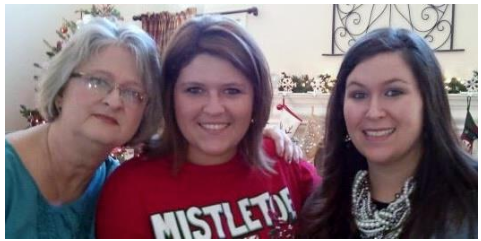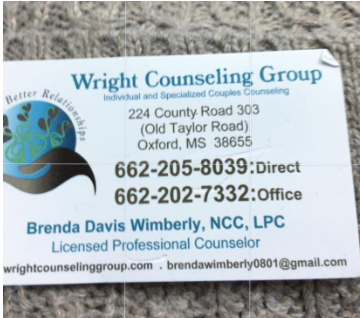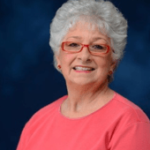*The latest installment in the Ole Miss Retirees features former university systems analyst Brenda Wimberly. The organization’s mission is to enable all of the university’s faculty and staff retirees to maintain and promote a close association with the university. It is the goal of the Ole Miss Faculty/Staff Retirees Association to maintain communication by providing opportunities to attend and participate in events and presentations.

Brenda Wimberly is such a kind, caring, talented lady. She’s the person that everyone wants to be friends with and she includes you in her circle with a genuine welcome. She is focused and determined, warm and generous. Brenda has managed to have two amazing and successful careers. Here is her Ole Miss story.
Brown: Where did you grow up? Where did you go to school?
Wimberly: I was born in Lafayette County and lived here my entire life. I lived in Tula and attended Lafayette County schools until the 11th grade (except for the 5th grade when I attended Oxford Elementary). My family moved to Oxford in 1969 and I transferred to Oxford High School where I graduated in 1970.
Brown: Tell us how/when your Ole Miss “story” began? Who hired you? How long did you work at Ole Miss?
Wimberly: I graduated high school one year early with no plans for the future. My parents suggested that I get a job until I decided what I wanted to do. I had just turned 17 a few weeks before starting my job search, so I truly did not expect anyone to hire me. The first person who interviewed me quickly told me that I was too young. On my second interview, Vera Locke, a precious lady in the Data Processing Department (later known as Office of Information Technology), hired me as a keypunch operator. I loved my job and enrolled in a few classes at the university. Although I retired at 40 years old, I continued to work part-time until this past year which means I worked in some capacity at Ole Miss for 47 years!
Brown: What position(s) did you hold? What were your job responsibilities?
Wimberly: I was hired as a keypunch operator. That was how data was entered into a computer in the early 1970s. We were not busy at work one day so we took an aptitude test which was used to hire computer programmers. I never knew what I scored on the test until several months later when I was promoted to programmer trainee. I learned how to program and design data systems while on the job. The positions I held were a programmer, systems analyst, and manager until I retired from full-time service in January 1994. I worked with recruitment, admissions, student records, registration, financial aid, graduation, and various other data systems. I interacted with staff members in the various offices to determine their data needs, then designed computer programs to meet those needs. As Manager of Systems Development, I was responsible for supervising programming staff and implementing new data systems for the university. The job required working extra hours and being on call quite often. After retiring, I worked part-time as a systems analyst for the Office of Information Technology and later at the Office of Institutional Research and Assessment when my boss and good friend, Mary Harrington, became the director and asked me to work with her.
Brown: You’ve had two very successful careers. Can you talk about them? When did you decide to pursue a career in counseling?
Wimberly: I would start by saying that I feel blessed to have been given the opportunities to pursue these careers. When I started working at the university in 1970, I had no idea I would be writing computer programs and designing systems to automate work processes. So many people believed in me along the way and gave me a chance to advance my career. I worked with so many incredible people during my time on campus. When I retired at 40 years old, I planned to finish my degree and get another full-time job in the same field. Although I did get my bachelor’s degree, I quickly discovered that I would most likely have to move away in order to find a job doing what I loved. I was offered a job in Auburn, Alabama, but a trip to tour the area turned into a lesson I never forgot. It was not in God’s plan for me to move that far away. Shortly after that trip, my husband had major heart issues and my parents were beginning to have health problems. I continued working part-time for the university but still wanted to find a full-time job and knew I would have to change fields. One day, I walked into the graduate advisor’s office and determined that I needed to get my master’s degree even though I had no idea what degree I wanted to pursue. I found the counseling program in the catalog and asked about the admission process. The deadline was looming so I quickly took the GRE and interviewed with the program director. I entered the program that fall. I was part-time so it took me three years to complete my degree. In order to get a license to use for private practice, I had to have 3,500 direct/indirect hours. I was in my 50s by that time and getting that many hours working part-time seemed out of reach. I did some counseling with the EDHE program on campus then I was hired to work on an as-needed basis at an outpatient program in Senatobia. I was doing group counseling with mostly elderly clients on the days I was not working on campus. Later, I was hired to work as an outpatient therapist at Parkwood Behavioral Hospital. I worked mostly on weekends and occasionally during the week. In 2016, I received my license to practice on my own. Terri Wright, my mentor and supervisor while working on the hours to get my license, offered me a job working with her at Wright Counseling Group. I work with couples and individuals with various issues and concerns. I have advanced training in Emotional Focused Therapy for couples. It is so rewarding to be able to help people. I may have retired from full-time employment in 1994, but I have never stopped working.

Brown: What advice would you give to your 20-year-old self?
Wimberly: I am not sure my 20-year-old self would listen, but I would tell her that her hard work would pay off. I would remind her to live in the present and not focus so much on the future or past. I would tell her to always be grateful and to cherish the friends she meets along her path and the family who supports her through the long work hours and late night classes. Finally, I would remind her to focus her attention and energy on things that are most important and for her to always be kind.
Brown: Tell us something about yourself that people might not know.
Wimberly: This story is not about me, but something I was a part of years ago. In the early 1970s women in the Lyceum, where I worked at the time, were not allowed to wear pants. I am not sure if it was an official campus rule, but all women whose offices were in the Lyceum wore dresses. This was typical for the times because I had to wear dresses in school until the 11th grade. Women in the building started talking about it and decided that it did not seem right that we were not allowed to wear dress pants. Finally, the decision was made to make a statement so most of the women in the Lyceum wore pants to work one day. I was not concerned about my job since my boss also wore pants that day! No one said a word, although we got some surprised looks. I am not sure if any rules had to change, but after that day, we started wearing pants to work without giving it a second thought. Through the years I learned the value of standing up for things I feel are right or important. And I know that the opportunities and rights I am afforded in the workplace came about because someone cleared the path for me. For that I am grateful.
Brown: Is there anything else you’d like to talk about?
Wimberly: Yes, the stigma that is sometimes attached to mental health problems. Although our society has come a long way in recognizing the importance of getting help for mental health concerns, I am alarmed at the people who still feel as though there is something wrong with a person with depression, anxiety, or any emotional distress. Everybody has had something to overcome. Seeking help is a sign of strength, not weakness. So many people have been blamed for their condition, called names, or shamed into thinking there is something wrong with them. People are hurting and need compassion instead of judgment. It is easy for some people to think that others are exaggerating or making up symptoms for attention, but this mindset is dangerous. It can be challenging to understand something you have never experienced, but you never truly know what someone else is going through.

 Bonnie Brown is a retired staff member of the University of Mississippi. She most recently served as Mentoring Coordinator for the Ole Miss Women’s Council for Philanthropy.
Bonnie Brown is a retired staff member of the University of Mississippi. She most recently served as Mentoring Coordinator for the Ole Miss Women’s Council for Philanthropy.
For questions or comments, email hottytoddynews@gmail.com.
